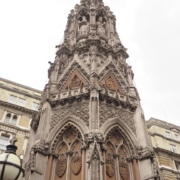The Burning Man
Tuesday, October 15, 2019
Have you ever known someone who was on fire for Jesus? What does it mean to be on fire for Jesus? What does it take to burn with such passion and zeal? How is Jesus symbolized in the Priestly Tabernacle of Moses? How is our walk with Jesus symbolized in these symbols from the Old Testament? Are you a “burning man” for the Lord?
Revelation 1:15 His feet glowed like burnished (bright) bronze as it is refined in a furnace, and His voice was like the sound of many waters.
This strange depiction of Jesus found in the book of Revelation reminds us of another Old Testament depiction found in the book of Daniel, chapter 10, verse 6: His body also was [a golden luster] like beryl, his face had the appearance of lightning, his eyes were like flaming torches, his arms and his feet like glowing burnished bronze, and the sound of his words was like the noise of a multitude [of people or the roaring of the sea].
It’s an intriguing fact that Israel camped around Moses’ Priestly Tabernacle in the form of a cross. 3 Tribes to the north, south, east and west. Even more intriguing is the fact that when the furnishings of the Tabernacle are laid out they also form a cross. To enter the Tabernacle the priest could only go through one door. Jesus referred to Himself as the Door or the Gate for the Sheep in John 10 repeatedly, and also stated in John 14:6 that He was the Way. With that in mind when you see the Priestly Tabernacle as a type, shadow, or symbol of the Cross of Christ you discover that as you enter the Door the very first thing you will see is the Bronze Altar. This altar is where all of the sacrifices took place, especially the sacrifice of lambs. The Amplified Translation makes reference to this in 1 Peter 2:24 when it states: He personally bore our sins in His [own] body on the tree [as on an altar and offered Himself on it], that we might die (cease to exist) to sin and live to righteousness. By His wounds you have been healed.
We know from Scripture the story of Abraham’s willingness to sacrifice his only son, Isaac on an altar. What’s easy to miss is the rest of the story: Genesis 22:7-8 And Isaac said to Abraham, My father! And he said, Here I am, my son. [Isaac] said, See, here are the fire and the wood, but where is the lamb for the burnt sacrifice. Abraham said, My son, God Himself will provide a lamb for the burnt offering. So the two went on together.
The story concludes in Genesis 22:10-14And Abraham stretched forth his hand and took hold of the knife to slay his son. But the Angel of the Lord called to him from heaven and said, Abraham, Abraham! He answered, Here I am. And He said, Do not lay your hand on the lad or do anything to him; for now I know that you fear and revere God, since you have not held back from Me or begrudged giving Me your son, your only son. Then Abraham looked up and glanced around, and behold, behind him was a ram caught in a thicket by his horns. And Abraham went and took the ram and offered it up for a burnt offering and an ascending sacrifice instead of his son! So Abraham called the name of that place The Lord Will Provide. And it is said to this day, On the mount of the Lord it will be provided.
To come to the Bronze Altar was to come before the feet of the Burning Man, the Man whose feet glowed like burnished bronze refined in a furnace. For those of us called to not only kneel before Him at the Cross, but to join Him in being crucified with Him on the Cross, we become altars ourselves. Consider the following exhortations: Romas 12:1 I appeal to you therefore, brethren, and beg of you in view of [all] the mercies of God, to make a decisive dedication of your bodies [presenting all your members and faculties] as a living sacrifice, holy (devoted, consecrated) and well pleasing to God, which is your reasonable (rational, intelligent) service and spiritual worship.
Add to this Scripture Hebrews 13:10-15 We have an altar from which those who serve and worship in the tabernacle have no right to eat. For when the blood of animals is brought into the sanctuary by the high priest as a sacrifice for sin, the victims’ bodies are burned outside the limits of the camp. Therefore Jesus also suffered and died outside the [city’s] gate in order that He might purify and consecrate the people through [the shedding of] His own blood and set them apart as holy [for God]. Let us then go forth [from all that would prevent us] to Him outside the camp [at Calvary], bearing the contempt and abuse and shame with Him. For here we have no permanent city, but we are looking for the one which is to come. Through Him, therefore, let us constantly and at all times offer up to God a sacrifice of praise, which is the fruit of lips that thankfully acknowledge and confess and glorify His name.
We join Jesus in carrying the wood of our flesh, and the fire of obedient sacrifice, as we join Jesus in carrying His cross up to Golgotha, the place of the skull. Here we put to the death that which is at war with God – the mind of the soul man. Here we allow His cross to penetrate our skulls to free our spirit man from its prison bringing it to surrender and bow in submission before the transforming power of His Spirit and Word. Here we become an altar and our walk burns like burnished bronze as we follow in the steps of our Lord and King.
When I was younger fellow Christians would talk about another believer being “on fire” for the Lord. We all knew what it meant but very few knew what it would take to burn with such love and passion. Here in Moses’ depiction of the priestly tabernacle we discover a good place to begin.




